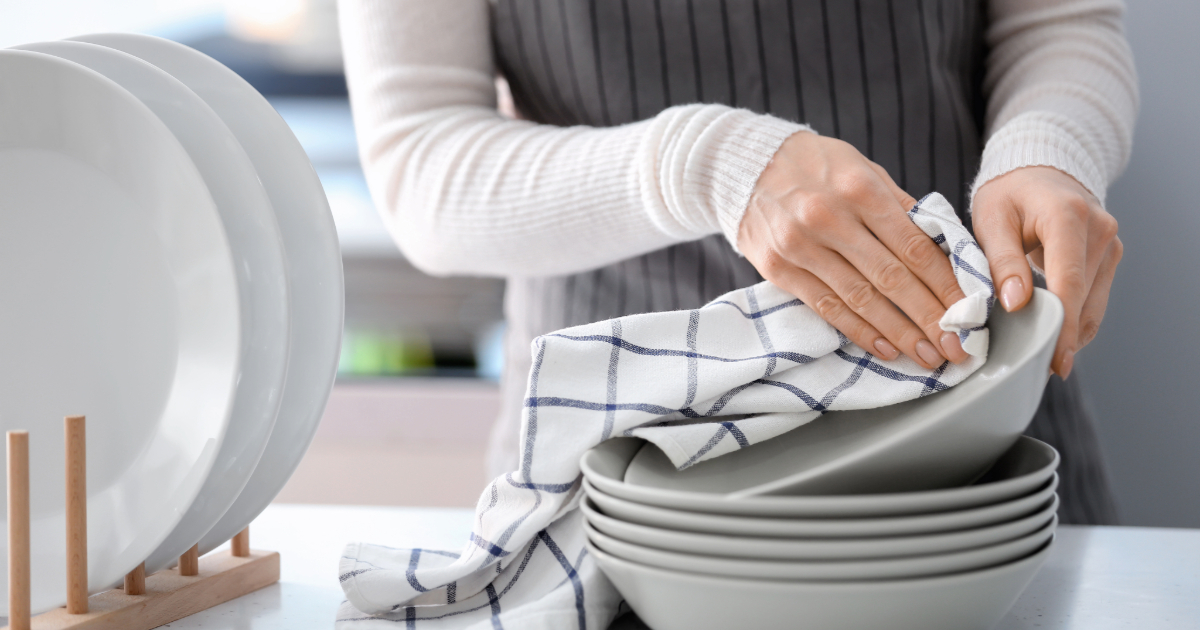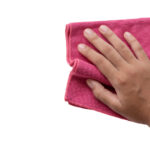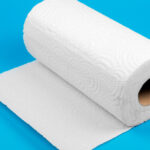Dish towels are essential items in every kitchen. They absorb messes, dry dishes, and wipe down counters.

However, handling raw food and various spills can cause dish towels to become dirty and contaminated with bacteria throughout the day. That’s why knowing how to properly wash dish towels is so important.
Sort Dish Towels Properly
The first step in good dishwashing practices is proper sorting. Set your dirty dish towels aside from your regular household laundry.
Wash Very Soiled Towels Separately
Dish towels used for raw meats, greasy messes, and major spills should always be washed separately. According to laundry expert Mary Gagliardi, aka “Dr. Laundry,” you should also wash items like mop heads and cleaning cloths separately from everyday laundry.
However, if you only have a towel or two that need washing, it’s OK to throw them in with a normal load of white laundry. But towels covered in food particles or heavy soil need their own wash cycle.
Key Takeaway: Heavily soiled kitchen towels breed bacteria. Wash them separately from regular laundry.
Pre-Treat Stains and Odors
Before washing, check dish towels for visible stains or lingering odors and pre-treat as needed. Here are some tips:
Pre-treating stains and odors is an important first step to get your dish towels thoroughly clean.
Wash Towels in Hot Water
When ready to wash, place your sorted and pre-treated dish towels directly into the washing machine. Do not mix them with regular household laundry.
Set the Machine to Its Hottest Setting
To kill bacteria, it’s crucial to wash dish towels using the hottest water temperature recommended for that fabric. Most cotton dish towels can safely withstand hot washes.
Turn your water heater up the night before washing towels to ensure your pipes push hot water into the cycle. You can also run an empty hot water rinse before adding towels. This pre-heats your pipes to maintain high temperatures.
Key Takeaway: Hot water washes are essential for killing bacteria lurking in dirty dish towels.
Add Bleach to the Cycle
For superior disinfecting of white, bleach-safe cotton towels, add liquid chlorine bleach to the wash cycle. Pour it into your machine’s designated bleach dispenser only – never directly onto the laundry.
The standard bleach ratio is 1⁄3 cup bleach per full load. If your towels aren’t white, pick a color-safe bleach to disinfect without dye damage.
Use Heavy Duty Settings
Wash dish towels using your machine’s heavy duty settings, even if the fabric care labels says “delicate.” The intense wash action helps release embedded food, grease, and grime that can trap germs inside the towels.
Dry Thoroughly Before Storage
Proper drying is key to preventing mildew and bacteria growth in clean dish towels.
Air Dry Towels If Possible
For best results, hang-dry your dish towels or lay them flat to air dry. Direct sunlight naturally sanitizes as it dries. Avoid bunching towels together so air can fully circulate between them.
If air drying isn’t realistic for your lifestyle, you can tumble dry dish towels on low heat instead. Just remove them promptly when finished to prevent re-wetting from humidity.
Store Completely Dry Towels
Before placing back into kitchen rotation, make sure towels are 100% dry. Even slight moisture can allow odor and stain-causing bacteria to take hold again. Roll up dried towels or stack neatly until the next use.
Key Takeaway: Moisture makes dish towels prone to bacterial growth. Ensure they dry fully before storage or reuse.
Maintain a Handy Towel Rotation
Having ample towels on hand makes it easy to use a fresh towel whenever one gets dirty. Follow these tips:
Own Several Sets of Dish Towels
Cycle multiple sets of towels per week, just like having multiple loads of laundry. Allowing used towels to air out prevents continual reuse while damp or dirty.
Change Dish Towels Daily
Swap out kitchen towels daily, or anytime they get wet or handle raw food. Hanging up towels between tasks helps them dry and stay fresh for next use.
Wash Towels at Least Twice Weekly
To control bacteria growth, launder your dish towels every 2-3 days minimum, according to most experts. Soiled towels should be washed after one use.
Store Disinfectants Under the Sink
Keep bleach, dish soap, and other pre-treatment products accessible under your kitchen sink or nearby. This allows you to easily tackle stains and odors between washes. Having a ready arsenal of cleaning products prevents permanent setting of new stains.
Here are the most useful products to have on-hand:
Place stained or smelly towels into a plastic container until wash day. Use disinfecting wipes to quickly clean the bin and kill germs between uses.
FAQs
How should I dry towels if I don’t want to use the dryer?
Hang towels over a towel rod or clothes drying rack. You can also drape them over cabinet handles or the oven door handle while taking care not to create a fire hazard. Laying flat to air dry also works well.
What temperature should dish towels be washed in?
Aim for the hottest setting recommended on the fabric care label. Most cotton dish towels can withstand temperatures of 140°F or above. This high heat kills more bacteria.
Should I use fabric softener when washing dish towels?
No. Fabric softeners leave an invisible film on towels that reduces their absorbency. Softener residue also traps moisture and detergent in towels, encouraging bacterial growth.
Can I wash my dish towels with bath towels or other household laundry?
It’s best to always wash dish towels separately in their own load. Bacteria and food residue can transfer onto your other laundry. Towels also shed lint, which can cling to clothes.
How should I wash dishcloths made from microfiber?
Microfiber cleaning cloths need special care. Wash them alone in cool water using no detergent or bleach to prevent damage to the delicate fibers. Then air dry for best results.
Conclusion
Taking time to properly handle, wash, and store your towels makes a huge difference in longevity and preventing the spread of germs.
Treat your dish towels well and they’ll absorb kitchen spills for you cleanly and safely for years to come.








